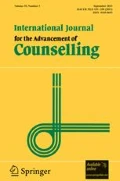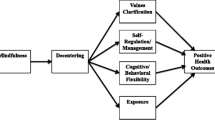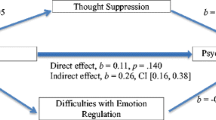Abstract
Research on Asian Americans and their psychological adjustment is limited. Consisting of two cross-sectional studies, the present investigation examined the relationships among self-concealment, mindfulness, emotional distress in stressful interpersonal situations, and general psychological ill-health in Asian American college students, and in comparison with European American counterparts. In the Asian Americans, self-concealment was found to be positively related to general psychological ill-health and negatively related to mindfulness. In both ethnic groups, mindfulness was found to be negatively related to general psychological ill-health. Findings suggest that, as seen with European American counterparts, both self-concealment and mindfulness may be important concepts in understanding the psychological adjustments of Asian American college students.
Similar content being viewed by others
References
Atkinson, D. R., & Gim, R. H. (1989). Asian-American cultural identity and attitudes toward mental health services. Journal of Counseling Psychology, 2, 209–212.
Atkinson, D., Morten, G., & Sue, D. (1998). Counseling American minorities (5th ed.). New York: McGraw-Hill.
Baer, R. A. (Ed.). (2006). Mindfulness-based treatment approaches: Clinician’s guide to evidence base and applications. New York: Academic.
Baer, R. A., Smith, G. T., Hopkins, J., Krietemeyer, J., & Toney, L. (2006). Using self-report assessment methods to explore facts of mindfulness. Assessment, 13, 27–45.
Banks, M. H., Clegg, C. W., Jackson, P. R., Kemp, N. J., Stafford, E. M., & Wall, T. D. (1980). The use of the general health questionnaire as an indicator of mental health in occupational studies. Journal of Occupational Psychology, 53, 187–194.
Beitel, M., Ferrer, E., & Cecero, J. J. (2005). Psychological mindedness and awareness of self and others. Journal of Clinical Psychology, 61, 739–750.
Bond, F. W., & Bunce, D. (2000). Mediators of change in emotion-focused and problem-focused worksite stress management interventions. Journal of Occupational Health Psychology, 5, 156–163.
Brown, K. W., & Ryan, R. M. (2003). The benefits of being present: mindfulness and its role in psychological well-being. Journal of Personality and Social Psychology, 84, 822–848.
Brown, R. A., Lejuez, C. W., Kahler, C. W., & Strong, D. R. (2002). Distress tolerance and duration of past smoking cessation attempts. Journal of Abnormal Psychology, 111, 180–185.
Brown, K. W., Ryan, R. M., & Creswell, J. D. (2007). Mindfulness: theoretical foundations and evidence for its salutary effects. Psychological Inquiry, 18, 211–237.
Cepeda-Benito, A., & Short, P. (1998). Self-concealment, avoidance of psychological services, and perceived likelihood of seeking professional help. Journal of Counseling Psychology, 45, 58–64.
Coffey, K. A., & Hartman, H. (2008). Mechanisms of action in the inverse relationship between mindfulness and psychological distress. Complementary Health Practice Review, 13, 79–91.
Cramer, K. M. (1999). Psychological antecedents to help-seeking behavior: a reanalysis using path modeling structures. Journal of Counseling Psychology, 46, 381–387.
Cramer, K. M., & Barry, J. E. (1999). Psychometric properties and confirmatory factor analysis of the self-concealment scale. Personality and Individual Differences, 27, 629–637.
Davis, M. (1980). A multidimensional approach to individual differences in empathy. JSAS Catalog of Selected Documents in Psychology, 41, 330–339.
Davis, M. H. (1983). Measuring individual differences in empathy: evidence for a multidimensional approach. Journal of Personality and Social Psychology, 44, 113–126.
DiBartolo, P. M., Li, C. Y., & Frost, R. O. (2008). How do the dimensions of perfectionism relate to mental health. Cognitive Therapy and Research, 32, 401–417.
Gim, R. H., Atkinson, D. R., & Whiteley, S. (1990). Asian-American acculturation, severity of concerns, and willingness to see a counselor. Journal of Counseling Psychology, 37, 281–285.
Goldberg, D. (1978). Manual of the general health questionnaire. Windsor: National Foundation for Educational Research.
Gross, J. J. (1998). The emerging field of emotion regulation: an integrative review. Review of General Psychology, 2, 271–299.
Hall, C. C. I. (1995). Asian eyes: body image and eating disorders of Asian and Asian American women. Eating Disorders: The Journal of Treatment and Prevention, 3, 8–19.
Hayes, S. C., & Wilson, K. G. (2003). Mindfulness: method and process. Clinical Psychology: Science and Practice, 10, 161–165.
Hayes, S. C., Follette, V. M., & Linehan, M. M. (2004). Mindfulness and acceptance: Expanding the cognitive-behavior tradition. New York: Guilford.
Hayes, S. C., Luoma, J., Bond, F., Masuda, A., & Lillis, J. (2006). Acceptance and commitment therapy: model, processes, and outcomes. Behaviour Research and Therapy, 44, 1–25.
Hwang, W., Myers, H. F., & Takeuchi, D. T. (2000). Psychosocial predictors of first-onset depression in Chinese Americans. Social Psychiatry and Psychiatric Epidemiology, 35, 133–145.
Hwang, W., & Ting, J. Y. (2008). Disaggregating the effects of acculturation and accultrative stress on the mental health of Asian American. Cultural Diversity and Ethnic Minority Psychology, 14, 147–154.
Kabat-Zinn, J. (2003). Mindfulness-based interventions in context: past, present, and future. Clinical Psychology: Science and Practice, 10, 144–156.
Kahn, J. H., & Hessling, R. M. (2001). Measuring the tendency to conceal versus disclose psychological distress. Journal of Social and Clinical Psychology, 20, 41–65.
Kelly, A. E. (1998). Client’s secret keeping in outpatient therapy. Journal of Counseling Psychology, 45, 50–57.
Kelly, A. E., & Yip, J. J. (2006). Is keeping a secret or being a secretive person linked to psychological symptoms? Journal of Personality, 74, 1349–1369.
Kim, B. S. K., & Omizo, M. M. (2006). Behavioral acculturation and enculturation and psychology functioning among Asian American college students. Cultural Diversity and Ethnic Minority Psychology, 12, 245–258.
Kim, B. S. K., Atkinson, R. D., & Yang, P. H. (1999). The Asian values scale: development, factor analysis, validation, and reliability. Journal of Counseling Psychology, 46, 342–352.
Kim, B. S. K., Atkinson, R. D., & Umemoto, D. (2001). Asian cultural values and the counseling process: current knowledge and directions for future research. The Counseling Psychologist, 29, 342–352.
Lane, J. D., & Wegner, D. M. (1995). The cognitive consequences of secrecy. Journal of Personality and Social Psychology, 69, 237–253.
Larson, D. G., & Chastain, R. L. (1990). Self-concealment: conceptualization, measurement, and health implications. Journal of Social and Clinical Psychology, 9, 439–455.
Lau, A. S., Fung, J., Wang, S., & Kang, S. (2009). Explaining elevated social anxiety among Asian Americans; emotional attunement and a cultural double bind. Cultural Diversity and Ethnic Minority Psychology, 15, 77–85.
Leong, F. T. L., & Lau, A. S. L. (2001). Barriers to providing effective mental health services to Asian Americans. Mental Health Services Research, 3, 201–214.
Liao, H., Rounds, J., & Klein, A. G. (2005). A test of Cramer’s (1999) help-seeking model and acculturation effects with Asian and Asian American college students. Journal of Counseling Psychology, 52, 400–411.
Lin, K. M., & Cheung, F. (1999). Mental health issues for Asian Americans. Psychiatric Services, 50, 774–780.
Loo, R. (1995). Cross-cultural validation of the dual nature of the EPQ Lie Scale with a Japanese sample. Personality and Individual Differences, 18, 297–299.
Markus, H. R., & Kitayama, S. (1991). Culture and the self: implications for cognition, emotion, and motivation. Psychological Review, 98, 224–253.
McCracken, L. M., Gauntlett-Gilbert, J., & Vowles, K. E. (2007). The role of mindfulness in a contextual co gnitive behavioral analysis of chronic pain-related suffering and disability. Pain, 131, 63–69.
Mok, T. A. (1998). Getting the message: media images and stereotypes and their effects on Asian Americans. Cultural Diversity and Mental Health, 4, 185–202.
Morita, S. (1998). Morita therapy and the true nature of anxiety-based disorders (shinkeishitsu). Albany: State University of New York.
Noh, E. (2007). Asian American women and suicide: problems of responsibility and healing. Women & Therapy, 30, 87–107.
Okazaki, S. (1997). Sources of ethnic differences between Asian American and White American college students on measures of depression and social anxiety. Journal of Abnormal Psychology, 106, 52–60.
Okazaki, S. (1998). Teaching gender issues in Asian American psychology. Psychology of Women Quarterly, 22, 33–52.
Okazaki, S. (2000). Asian American and White American differences on affective distress symptoms: do symptom reports differ across reporting methods? Journal of Cross-Cultural Psychology, 31, 603–625.
Okazaki, S., Liu, J. F., Longworth, S. L., & Minn, J. Y. (2002). Asian American-White American differences in expression of social anxiety: a replication and extension. Cultural Diversity and Ethnic Minority Psychology, 8, 234–247.
Park, Y. S., Vo, L. P., & Tsong, Y. (2009). Family affection as a protective factor against the negative effects of perceived Asian values gap on the parent-child relationship for Asian American male and female college students. Cultural Diversity and Ethnic Minority Psychology, 15, 18–26.
Pennebaker, J. W., & Beall, S. K. (1986). Confronting a traumatic event: toward an understanding of inhibition and disease. Journal of Abnormal Psychology, 95, 274–281.
Pyke, K. D., & Johnson, D. L. (2003). Asian American women and racialized feminities: “doing” gender across cultural worlds. Gender & Society, 17, 33–53.
Sue, S., & Chu, J. Y. (2003). The mental health of ethnic minority groups: challenges posed by the supplement to the surgeon general’s report on mental health. Culture, Medicine, and Psychiatry, 27, 447–465.
Suh, H. S. (2007). Too maternal and not womanly enough: Asian-American women’s gender identity conflict. Women & Therapy, 30, 35–50.
Suinn, R. M., Ahuna, C., & Khoo, G. (1992). The Suinn-Lew Asian self-identity acculturation scale: concurrent and factorial validation. Educational and Psychological Measurement, 52, 1041–1046.
Suyemoto, K., Liem, J., Kuhn, J., Mongillo, E., & Tauriac, J. (2007). Training therapists to be culturally sensitive with Asian American women clients. Women & Therapy, 30(3/4), 209–227.
Wegner, D. M. (1994). Ironic processes of mental control. Psychological Review, 101, 34–52.
Wismeijer, A. A. J., van Assen, M. A. L. M., Sijtsma, K., & Vingerhoets, A. J. J. M. (2009). Is the negative association between self-concealment and subjective well-being mediated by mood awareness? Journal of Social and Clinical Psychology, 28, 728–748.
Zhang, N., & Dixon, D. M. (2003). Acculturation and attitudes of Asian International students toward seeking psychological help. Journal of Multicultural Counseling and Development, 31, 205–222.
Author information
Authors and Affiliations
Corresponding author
Rights and permissions
About this article
Cite this article
Masuda, A., Wendell, J.W., Chou, YY. et al. Relationships Among Self-Concealment, Mindfulness and Negative Psychological Outcomes in Asian American and European American College Students. Int J Adv Counselling 32, 165–177 (2010). https://doi.org/10.1007/s10447-010-9097-x
Published:
Issue Date:
DOI: https://doi.org/10.1007/s10447-010-9097-x




